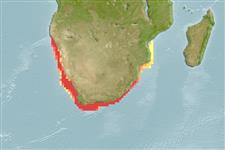Common names from other countries
Environment: milieu / climate zone / depth range / distribution range
экология
морской демерсальный; пределы глубины 10 - 390 m (Ref. 4316). Subtropical; 18°S - 36°S, 12°E - 36°E
Southeast Atlantic and Western Indian Ocean: Cape Fria, Namibia to Maputo, Mozambique. The record of a specimen from Reunion (MHNRUN 36) is probably erroneous (Ref. 33390).
Length at first maturity / Size / Вес / Возраст
Maturity: Lm 32.8, range 27 - 35 cm
Max length : 75.0 cm TL самец/пол неопределен; (Ref. 3699); common length : 35.0 cm TL самец/пол неопределен; (Ref. 3699); наибольший возраст (опубликованны данные): 16 годы (Ref. 26321)
Краткое описание
определительные ключи | морфология | морфометрия
колючие лучи спинного плавника (общее число) : 8 - 9; членистые (мягкие) лучи спинного плавника (общее число) : 15 - 17; колючие лучи анального плавника: 0; членистые (мягкие) лучи анального плавника: 14 - 16.
Found over sandy and muddy bottoms in coastal areas. Feeds on fishes (Ref. 4316) and crustaceans (Ref. 5213). Excellent food fish (Ref. 4316).
Life cycle and mating behavior
Maturities | размножение | Spawnings | Egg(s) | Fecundities | личинки
Richards, W.J. and V.P. Saksena, 1990. Triglidae. p. 680-684. In J.C. Quero, J.C. Hureau, C. Karrer, A. Post and L. Saldanha (eds.) Check-list of the fishes of the eastern tropical Atlantic (CLOFETA). JNICT, Lisbon; SEI, Paris; and UNESCO, Paris. Vol. 2. (Ref. 3687)
Статус Красного Списка МСОП (Ref. 130435)
CITES (Ref. 128078)
Not Evaluated
Угроза для людей
Harmless
Использование человеком
рыболовство: коммерческий
дополнительная информация
инструменты
Специальные отчеты
Скачать в формате XML
ресурсы в Интернет
Estimates based on models
Preferred temperature (Ref.
115969): 10.3 - 17.9, mean 13.3 (based on 65 cells).
Phylogenetic diversity index (Ref.
82804): PD
50 = 0.5010 [Uniqueness, from 0.5 = low to 2.0 = high].
Bayesian length-weight: a=0.00912 (0.00427 - 0.01947), b=3.05 (2.87 - 3.23), in cm Total Length, based on LWR estimates for this (Sub)family-body shape (Ref.
93245).
Trophic level (Ref.
69278): 4.1 ±0.3 se; based on diet studies.
устойчивость к внешним воздействиям (Ref.
120179): низкий, минимальное время удвоения популяции 4.5-14 лет (K=0.14; tm=2-5; tmax=12).
Fishing Vulnerability (Ref.
59153): High to very high vulnerability (65 of 100).
Climate Vulnerability (Ref.
125649): Moderate to high vulnerability (48 of 100).
